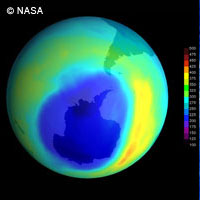EU celebrates 20th anniversary of the Montreal Protocol on ozone layer protection
This week the EU and the international community will celebrate the 20th anniversary of the Montreal Protocol to repair and protect the Earth's protective ozone layer. Taking place in Montreal, the celebrations will highlight the achievements of the treaty, which agreed to phase out 95% of ozone-depleting substances (ODS) and is widely regarded as the most successful international environmental treaty. From banning chlorofluorocarbons (CFCs) found in spray cans and refrigerators to phasing out hydrochlorofluorocarbons (HCFCs) and the pesticide methyl bromide, the EU and its Member States have played a leading role in the success of the Montreal Protocol. Going beyond its minimum requirements, the EU has been a driver for the development of innovative technologies to replace ozone-depleting substances with safer alternatives that are less harmful to human health and the ecosystem. Despite these achievements, scientists say the ozone layer is not expected to recover until some time between 2060 and 2075, making the timely recovery of the ozone layer heavily dependent on both agreed commitments being met and new challenges being tackled. 'The effective and united approach taken by the international community to combat ozone depletion demonstrates what can be achieved when there is the will to address environmental problems,' said EU Environment Commissioner Stavros Dimas. 'The flexibility and dynamism of the Montreal Protocol has proved its worth over the past 20 years. It has made significant contributions to tackling climate change and I am confident that it will continue to evolve to face future challenges. But it is important for the international community to make a renewed effort to bring forward the phase-out dates for HCFCs while ensuring that ozone- and climate-friendly alternatives take their place. The EU has already made a big step in that direction and will lend its support to other parties who want to follow us,' the Commissioner added. The conference in Canada will provide a forum for the signatories of the Protocol to address a number of new challenges such as the need to decrease the number of areas where ozone-depleting substances are not covered by the Protocol. They will also need to find ways to prevent ozone-depleting substances trapped in existing equipment and buildings from being released, as well as stopping the illegal trade in banned ozone-depleting substances. In addition to addressing these challenges, the international community will have to ensure that compliance with already existing commitments remains a priority and that the links with other international environmental agreements such as on climate change, persistent organic pollutants, waste, chemicals, and plant protection are strengthened.



